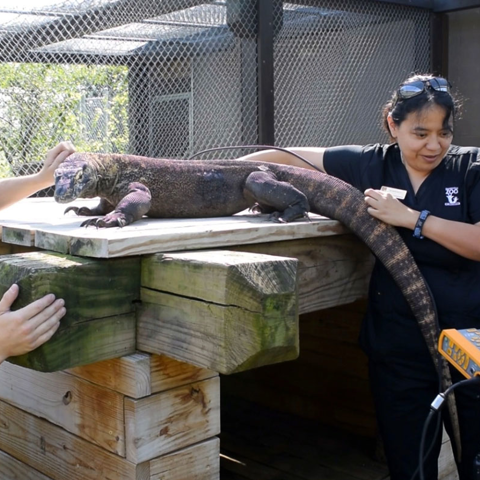Just like people that need to understand and take care of their reproductive health, we carefully monitor and care for the reproductive health of the animals at Nashville Zoo. One issue our keeper and veterinary staff monitor is egg dystocia (egg binding), which is the number one problem facing female Komodo dragons in human care. Egg binding occurs when follicles are not re-absorbed due to lack of breeding or eggs are not laid. Both of these issues can cause numerous internal problems, systemic bacterial infections and sometimes death.
To monitor this potential problem, Nashville Zoo keepers need to be able to work closely with Komodo dragons and perform routine ultrasounds, which can be difficult because of their potentially aggressive temperament and bite that can carry lethal bacteria.
Nashville Zoo herpetology keeper, Matt Martino, has been working with the Zoo’s two female Komodo dragons, Olivia and Agnes, since they hatched about 6 years ago, giving him the opportunity to train and work hands on with these reptiles, unlike most other dragon keepers. Most other zoo keepers work with Komodo dragons through a barrier such as a shift door or in a specially-designed restraint box.
.jpg)
Training these Komodo dragons to feel comfortable enough with humans to not need a barrier is important because using a barrier during exams can limit the amount of accurate data that’s collected, as well as agitate these giant lizards if kept in a restraint box for too long. At Nashville Zoo, the veterinary staff performs routine ultrasounds on the female dragons without barriers to check their reproductive status and general health.
Without barriers, the Komodo dragons have the freedom to call the shots as to when it’s time to wrap up.
“We work with the animals however long they decide to work,” Martino said. “There have been a few times one of the females decided they were done, so we just packed up the equipment and stopped.”
Martino has also been desensitizing these Indonesian lizards to sounds, touching, such as picking off their dead skin, since they were little, so when veterinary staff need to perform exams, they are used to human interaction and do not need to be restrained.
“All of these things seem like not too big of a deal, but they add up to make the dragons used to change, disturbances and people just touching them and understanding that it isn't scary or negative,” Martino said.
These bi-monthly ultrasound exams also help determine when each female can eventually be paired with a mate as part of the Komodo Dragon Species Survival Plan®.
.jpg)
“Currently, dragon introductions for breeding are always a scary thing because of potential aggression between the dragons, when first introduced to each other,” said Dale McGinnity, Nashville Zoo Ectotherm Curator. “We hope to develop a methodology that makes it safer for dragon introductions for breeding and make the breeding more successful in the future. We hope to determine this by knowing exactly which stage in follicular development of the female is optimal for introductions and breeding.”
For now, the Zoo team is continuing to research even better ways to work with these animals. The Zoo team hopes this work will help alleviate the reproductive issues that have been seen with some female dragons historically in zoos.



